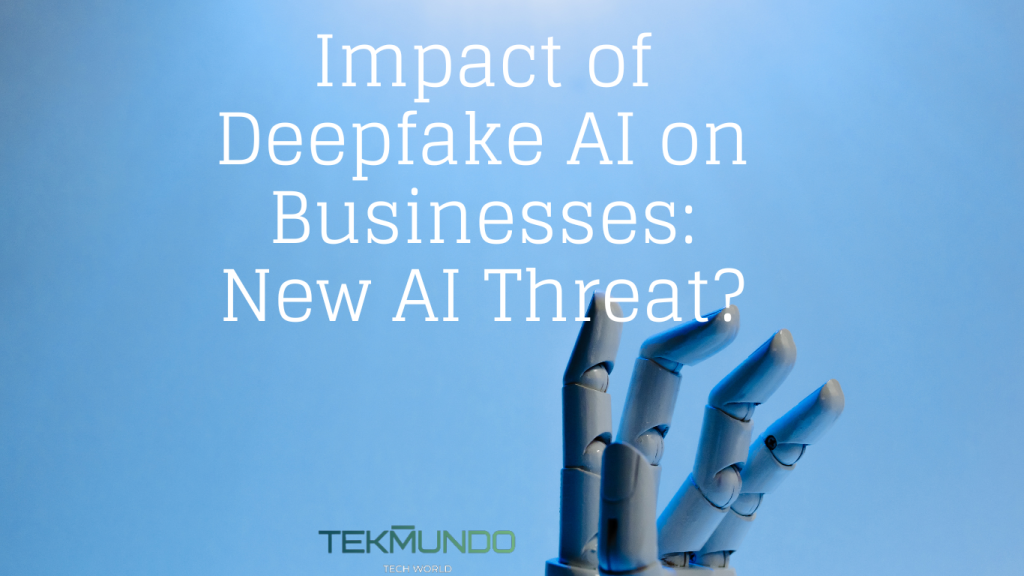The rapid advancement of technology is consistently proving to be a double-edged sword for businesses across the globe. The impact of deepfake AI might be the next potential threats for businesses as it is already creating a significant ripple in the cyber world.
While they are mind-blowingly innovative, these sophisticated technologies harbor the potential to uncover unprecedented challenges and risks, especially for the business community.
What’s the Deepfake AI?
Have you ever come across videos or images of people you know but found out they were AI-generated? That’s deepfake AI.
Deepfake technology utilizes artificial intelligence to create hyper-realistic but entirely fake content, where existing images and videos are manipulated to portray scenarios or convey messages that were not originally present.
The term ‘deepfake’ itself emerges from “deep learning” (a subset of AI) and “fake”. Deepfake technology’s influence has permeated various sectors, wielding a powerful yet sometimes sinister hand over content creation and dissemination.
The Startling Accuracy
Imagine a video of a CEO announcing a new product that doesn’t exist or a political figure declaring war in a situation of peace.
The technology has reached a point where it’s becoming increasingly difficult to discern between what’s real and what’s not.
According to a study from University College London, deepfakes rank as the most serious AI crime threat. As of 2021, detecting deepfakes was largely manual, with 95% of deepfake detections achieved by human checkers.
Deepfake AI Implications for Businesses
The impact of deepfake AI on businesses brings myriad concerns, particularly concerning misinformation, reputation management, and financial stability. Here’s a detailed explanation of all concerns:
Reputation Management
Reputation is paramount in the business world. Deepfake technology has the capability to tarnish a company’s image by generating false representations of its leaders or brand ambassadors.
A well-prompted deepfake video can cause widespread misinformation, lead to customer distrust, and severely impact a brand’s reputation. Not to mention a potentially irreversible financial downfall.
Security Threats
Imagine receiving an email from your boss asking you to transfer funds to a specified account for an emergency requirement, complete with a video message for verification.
Only, it wasn’t really them.
This is no hypothetical scenario. In 2019, a UK-based energy firm’s CEO was deepfaked in a voice call to pilfer $243,000 successfully. Financial fraud through deepfake technology is not just a threat; it’s a reality.
Legal and Ethical Ramifications
Deepfake also poses the risk of embroiling companies in unwanted legal situations. Unauthorized use of a person’s likeness to deceive stakeholders or damage a reputation is grounds for legal action.
Plus, ethical dilemmas arise when considering how this technology may be weaponized against competitors in the market.
Preparing and Protecting Your Business
Deepfake AI technology is here to stay, so you must prepare to keep your business out of trouble. Here are some ways you can ensure your business is safe:
Investing in Detection Technologies
Safeguarding against the potential threat begins with investing in deepfake detection technologies.
Employing AI-driven systems that can analyze and verify the authenticity of digital content becomes a crucial line of defense.
Microsoft, for example, launched a tool that can analyze videos and photos to provide a confidence score about their authenticity.
Raising Awareness
Ensure that your team is aware of the potential risks of deepfake technology. Regular training sessions on the latest cyber threats and how to respond can be instrumental in preventing potential crises.
Not only on organizational levels but also on personal levels, people should invest time, money and effort in learning and raising awareness about the risks imposed by deepfake AI.
Implementing Robust Security Protocols
You must ensure that your security protocols are rigorous and multi-faceted. Incorporate multi-factor authentication, biometric verifications, and stringent data access controls to protect against deepfake-induced cyber fraud.
Final Thoughts
While the evolution of technology comes with manifold advantages, the impact of deepfake AI on businesses underscores the pivotal importance of operating with heightened alertness and advanced defence mechanisms.
The rise of deepfake technology is an undeniable threat to businesses, wherein the challenge lies in striking a balance between leveraging technological advancements and safeguarding against the sinister possibilities that come with them.
By understanding the threat landscape and adopting a robust defensive strategy, businesses can navigate these treacherous waters, ensuring stability and security in an era of digital deception.






